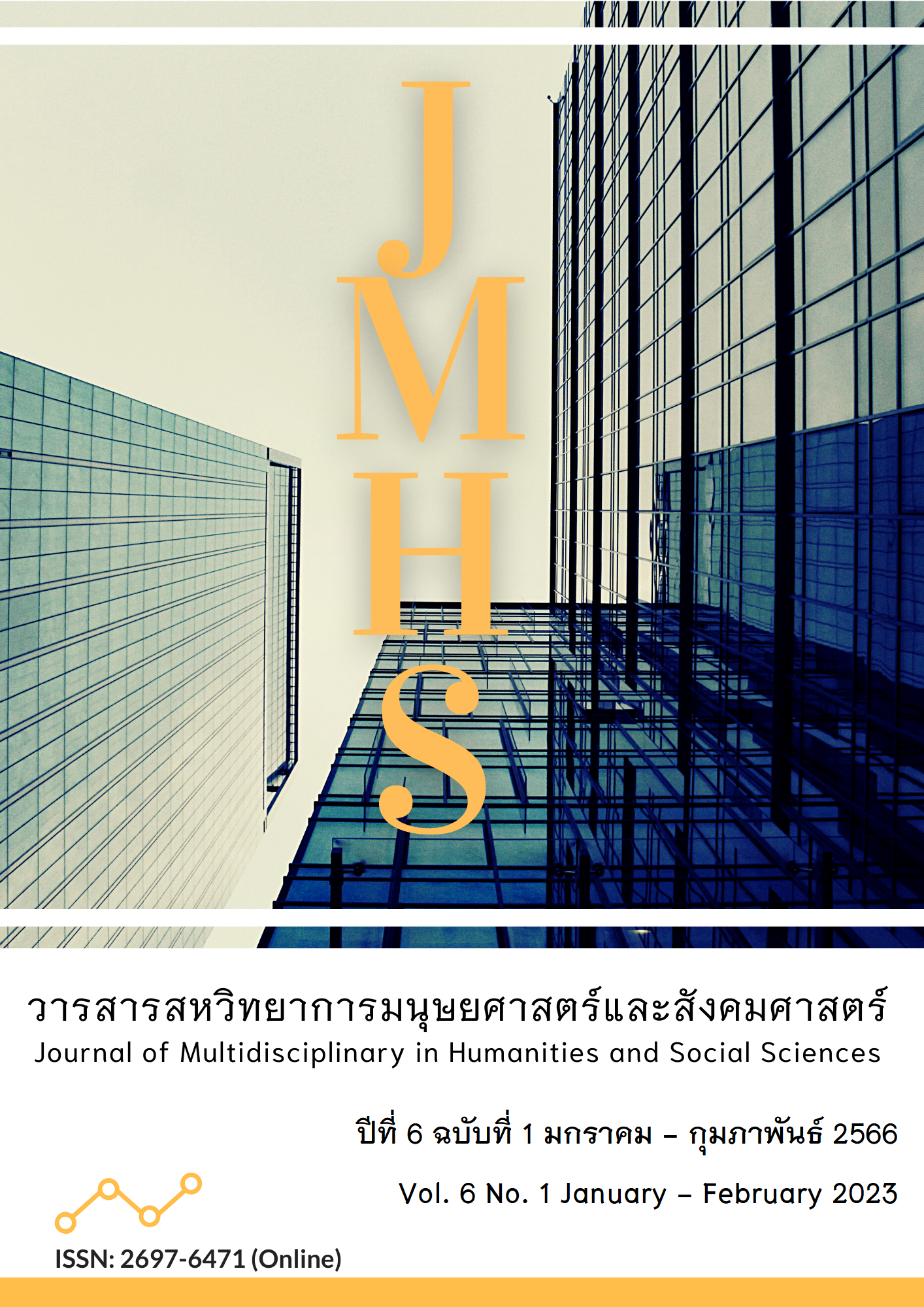แนวทางพัฒนาการบริหารงานตามหลักธรรมาภิบาล ของผู้บริหารโรงเรียนการกุศลของวัดในพระพุทธศาสนา จังหวัดร้อยเอ็ด
Main Article Content
บทคัดย่อ
บทความวิจัยนี้มีวัตถุประสงค์เพื่อ 1. ศึกษาการบริหารงานตามหลักธรรมาภิบาลของผู้บริหารโรงเรียนการกุศลของวัดในพระพุทธศาสนา จังหวัดร้อยเอ็ด 2. เปรียบเทียบการบริหารงานตามหลักธรรมาภิบาลของผู้บริหารโรงเรียนตามความคิดเห็นของครูและบุคลากรทางการศึกษา จำแนกตามเพศ ระดับการศึกษา และประสบการณ์การทำงาน และ 3. แนวทางพัฒนาการบริหารงานตามหลัก
ธรรมาภิบาลของผู้บริหารโรงเรียน ใช้ระเบียบวิธีวิจัยแบบผสานวิธี การวิจัยเชิงปริมาณ กลุ่มตัวอย่างครูและบุคลากรทางการศึกษาจำนวน 178 คน กำหนดขนาดกลุ่มตัวอย่างโดยใช้สูตรของทาโร ยามาเน วิเคราะห์ข้อมูลใช้สถิติค่าเฉลี่ย ส่วนเบี่ยงเบนมาตรฐาน และทดสอบค่า t-test และค่า F-test (one-way ANOVA) และการวิจัยเชิงคุณภาพ จากการสัมภาษณ์ผู้บริหารและครู จำนวน 8 คน ใช้วิธีวิเคราะห์เนื้อหา ผลการวิจัยพบว่า 1) ระดับปฏิบัติการบริหารงาน พบว่า โดยรวมอยู่ในระดับมาก เมื่อพิจารณาเป็นรายด้าน พบว่า ด้านนิติธรรม อยู่ในระดับมากที่สุด 2) ผลการวิเคราะห์เปรียบเทียบการบริหารงานตามหลักธรรมาภิบาล จำแนกตามเพศ ระดับการศึกษา และประสบการณ์การทำงาน พบว่า ครูและบุคลากรทางการศึกษาที่มีเพศต่างกัน มีระดับความคิดเห็นต่อการบริหารงานตามหลักธรรมาภิบาล โดยรวมทุกด้านไม่แตกต่างกัน ปฏิเสธสมมติฐานที่ตั้งไว้ และ 3) แนวทางการพัฒนาตามหลักธรรมา
ภิบาลของผู้บริหารโรงเรียน พบว่า (1) กำหนดเป้าหมายร่วมกัน (2) ส่งเสริมการใช้ทรัพยากรอย่างคุ้มค่า (3) สร้างความเชื่อมั่น (4) ส่งเสริมบุคลากรให้กระตือรือร้น (5) ทำงานโปร่งใส (6) ให้ผู้มีส่วนได้ส่วนเสียได้มีส่วนร่วม (7) กระจายอำนาจความรับผิดชอบ (8) ยึดข้อบังคับเคร่งครัดด้วยเมตตา (9) ไม่เลือกปฏิบัติ (10) เปิดโอกาสให้ทุกคนร่วมแสดงความคิดเห็น
Article Details

อนุญาตภายใต้เงื่อนไข Creative Commons Attribution-NonCommercial-NoDerivatives 4.0 International License.
ทัศนะและความคิดเห็นที่ปรากฏในวารสาร ถือเป็นความรับผิดชอบของผู้เขียนบทความนั้น และไม่ถือเป็นทัศนะและความรับผิดชอบของกองบรรณาธิการ
เอกสารอ้างอิง
กระทรวงศึกษาธิการ. (2546). พระราชบัญญัติการศึกษาแห่งชาติพุทธศักราช 2542 แก้ไขเพิ่มเติม (ฉบับที่ 2) พุทธศักราช 2545. กรุงเทพฯ: จุฬาลงกรณ์มหาวิทยาลัย.
กลุ่มส่งเสริมการศึกษาเอกชน สำนักงานศึกษาธิการจังหวัดร้อยเอ็ด (2564). โรงเรียนการกุศลของวัดในพระพุทธศาสนาในเขตจังหวัดร้อยเอ็ด. สืบค้นเมื่อ 8 กันยายน 2565, จากhttps://www.roietpeo.go.th/index.php/sitemap2.html
จุฑากาญจน์ เก่งกสิกิจ และ วรกาญจน์ สุขสดเขียว. (2564). การใช้หลักธรรมาภิบาลของผู้บริหารสถานศึกษาในสหวิทยาเขตธรรมจักรสังกัดสำนักงานเขตพื้นที่การศึกษามัธยมศึกษา เขต 5.วารสารสหวิทยาการมนุษยศาสตร์และสังคมศาสตร์, 4(3), 1142-1156.
จุฑามาศ ดีแป้น. (2564). การตัดสินใจของผู้บริหารกับประสิทธิผลของโรงเรียนสังกัดสำนักงานเขตพื้นที่การศึกษาประถมศึกษานนทบุรี. วารสาร มจร สังคมศาสตร์ปริทรรศน์, 10(1), 15-27.
จุฑามาศ ภูสง่า. (2560). การบริหารตามหลักธรรมาภิบาลโรงเรียนสังกัดสำนักงานเขตพื้นที่การศึกษามัธยมศึกษาเขต 24. (วิทยานิพนธ์ศึกษาศาสตรมหาบัณฑิต สาขาการบริหารการศึกษา). มหาวิทยาลัยมหามกุฎราชวิทยาลัย.
บรรจบ บุญจันทร์. (2556). การบริหารสถาบันเพื่อความเป็นเลิศ. มหาสารคาม: โรงพิมพ์มหาวิทยาลัยราชภัฏมหาสารคาม.
บุญชม ศรีสะอาด. (2553). การวิจัยเบื้องต้น. (พิมพ์ครั้งที่ 8). กรุงเทพฯ: สุวีริยาสาสน์.
ปฏิญญา ศรีสุข และ สุวัฒน์ จุลสุวรรณ์. (2563). แนวทางการบริหารงานโดยใช้โรงเรียนเป็นฐานของสถานศึกษาสังกัดสำนักงานเขตพื้นที่การศึกษาประถมศึกษากาฬสินธุ์ เขต 2. วารสารมหาจุฬานาครทรรศน์, 7(7), 171-183.
ปธาน สุวรรณมงคล. (2558). การบริหารงานภาครัฐกับการสร้างธรรมาภิบาล. กรุงเทพฯ: สถาบันพระปกเกล้า.
ปรรญฐ์จพลธ์ จิตต์ประยูร. (2562). แนวทางการบริหารสถานศึกษาตามหลักธรรมาภิบาล. วารสารมนุษยศาสตร์และสังคมศาสตร์ มหาวิทยาลัยราชพฤกษ์, 5(2), 178-192.
ผจญ อหันตะ, ชาญชัย ฮวดศรี และ ปัญญา คล้ายเดช. (2558). การบริหารงานตามหลักธรรมาภิบาลของผู้บริหารโรงเรียนของรัฐในอำเภอเมือง จังหวัดขอนแก่น. ธรรมทรรศน์, 15(3), 93-101.
พระราชบัญญัติการอุดมศึกษา. (2562). ราชกิจจานุเบกษา. เล่ม 136 ตอนที่ 57 ก.
รังสรรค์ ศรีโคตร, ชวนคิด มะเสนะ และ เกริกไกร แก้วล้วน. (2563). รูปแบบการบริหารงานบุคคลโรงเรียนการกุศลของวัดในพระพุทธศาสนา. วารสารมนุษยศาสตร์และสังคมศาสตร์ มหาวิทยาลัยนครพนม, 10(1), 1-10.
วิชิต บุญสนอง. (2554). แนวทางการเสริมสร้างธรรมาภิบาลในองค์กรปกครองส่วนท้องถิ่น กรณีศึกษาองค์การบริหารส่วนตำบลและเทศบาลในเขตอำเภอบางกรวย จังหวัดนนทบุรี. (รายงานการวิจัย). วิทยาลัยราชพฤกษ์.
ศิริ ถีอาสนา. (2557). เทคนิคการจัดการคุณภาพแนวใหม่: แนวคิด หลักการสู่การบริหารจัดการคุณภาพการศึกษา. (พิมพ์ครั้งที่ 2). มหาสารคาม: มหาวิทยาลัยราชภัฏมหาสารคาม.
สำนักงานคณะกรรมการพัฒนาการเศรษฐกิจและสังคมแห่งชาติ. (2559). แผนพัฒนาเศรษฐกิจและสังคมแห่งชาติ ฉบับที่ 12 (พ.ศ. 2560 - 2564). กรุงเทพฯ: สำนักงานคณะกรรมการพัฒนาการเศรษฐกิจและสังคมแห่งชาติ.
สำนักงานคณะกรรมการพัฒนาระบบราชการ. (2552). การจัดระดับการกำกับดูแลองค์กรภาครัฐตามหลักธรรมาภิบาลของการบริหารกิจการบ้านเมืองที่ดี. กรุงเทพฯ: สำนักงานคณะกรรมการพัฒนาระบบราชการ.
สำนักงานศึกษาธิการจังหวัดร้อยเอ็ด. (2563). ข้อมูลสารสนเทศด้านการศึกษา ประจำปีการศึกษา 2563. ร้อยเอ็ด: กลุ่มนโยบายและแผน สำนักงานศึกษาธิการจังหวัดร้อยเอ็ด.
สุรศักดิ์ ชะมารัมย์. (2554). ปัจจัยที่มีอิทธิพลต่อความสำเร็จของการนำหลักธรรมาภิบาลมาใช้ในการบริหารจัดการของสำนักงานพระพุทธศาสนาจังหวัดในเขตภาคตะวันออกเฉียงเหนือ. (วิทยานิพนธ์ปริญญารัฐประศาสนศาสตรมหาบัณฑิต สาขาวิชาวิทยาการจัดการ)มหาวิทยาลัยสุโขทัยธรรมาธิราช.
Cronbach, L.J. (1990). Essentials of psychological testing. (5th ed.). New York: Harper and Row.
Davis, G.A., & Thomas, M.A. (1989). Effective schools and effective teachers. Boston: Allyn and Bacon.
Koontz, H.D. (1972). Principles of Management: An Analysis of Managerial Functions. (5th ed.). New York: McGraw-Hill.
Williams, J.D. (1980). Public administration: The people’s Business. Boston: little Brown.
World Bank. (1989). From crisis to sustainable growth – sub Saharan Africa: A long-term perspective study. Washington, DC: The World Bank.
Yamane, T. (1973). Statistics: An Introductory Analysis. (3rd ed.). New York: Harper and Row.


